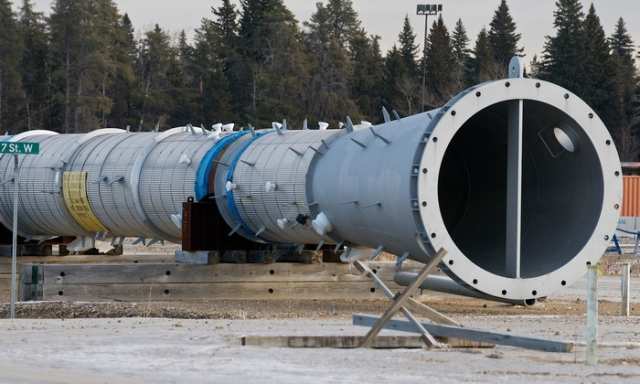
McConaghy: It’s time for Alberta to issue an ultimatum to the rest of Canada
![]()
Calgary Herald | APRIL 3, 2016 10:15 AM
Alberta has endured and overcome difficult commodity-price environments before. The price of oil in the early part of the last decade was not significantly higher than it is currently. What is different this time are the forces in play that are fundamentally at odds with the interests of Alberta — the federal government’s approach to enabling new interprovincial pipeline infrastructure and meeting national carbon-emission reduction targets.
Traditionally, Albertans have looked to their premier for leadership in defending their interests against a federal government at odds with those interests. But the Notley government would seem fundamentally conflicted. Its basic affinities remain with an agenda that would insist on the deconstruction of the Alberta hydrocarbon industry as almost a moral imperative. Committing ever more “process” and “dialogue” is not defending the province’s interests. At some point, a real stand must be taken, vigorously and publicly. It is time that Alberta began to directly link its position on carbon policy with market access.
The province’s interests will not be served by the current federal government, which recently implemented changes in the regulatory process to projects well after their applications were filed. These proposals cost hundreds of millions of dollars to mount and plans were long ago made that relied on a reasonable consistency and predictability in the regulatory process. Although the government has claimed that the objective of these changes is to restore “public trust and confidence,” the practical effect is to increase the probability of rejecting these proposals, most notably through the inclusion of upstream carbon-emission impacts, beyond the scope of the pipelines themselves. What should be managed as a matter of carbon policy is instead being imposed on the approval of infrastructure projects.
This is the same logic Barack Obama relied on to reject Keystone XL. It will now be invoked against proposals for the Energy East and Trans Mountain pipelines. Meanwhile, the federal government has de facto impugned the integrity of the NEB with no substantive reasons other than its decisions on Northern Gateway and the reversal of Line 9 did not conform to the expectations the country’s most radical NGO elements.
In pursuing its apparent carbon policy, the federal government has said it is committed to meeting GHG-reduction targets tabled at Paris that are fundamentally implausible, even by 2030, without massively contracting Canada’s existing hydrocarbon industry. Yet Environment Minister Catherine McKenna has said “Paris is a floor not a ceiling” for carbon-reduction ambitions. How extreme does she expect Canada to be in its pursuit of de-carbonization?

All of these most difficult circumstances are why Albertans must rely on their provincial government to take a stand. Here’s what they should demand:
First, suspend any implementation of the province’s new carbon tax initiative and any other carbon policy initiatives until two fundamental conditions are met: At least one pipeline for crude oil export and one related LNG export needs to be actually under construction; and the federal government must agree that paying Alberta’s carbon tax is the equivalent of reducing emissions in complying with any federal targets.
Second, the province should work with industry to revive the Keystone XL pipeline project, adapting to the outcome of the U.S. election. Only Keystone gives Alberta direct export access across its own U.S. border rather than leaving it dependent on Ottawa or other provinces in moving its oil across Canada.
To date, the Notley government has dealt with carbon policy and market access separately. They are, in fact, naturally linked: Increased market access for Alberta’s hydrocarbons increases the capacity and probability of increased production and, in turn, increased carbon emissions.
Increased emissions from Alberta can only be rationalized to a world seemingly committed to dealing with the climate change risk by resorting to carbon pricing via carbon taxes. Only by internalizing the unaccounted cost of the emissions economically can Alberta credibly claim to have dealt reasonably with that risk while preserving its hydrocarbon industry. The carbon price Alberta imposes on itself should be equivalent to what other relevant trading partners are imposing on themselves explicitly or implicitly.
Yet with all that, there should be a quid pro quo with the rest of the country. If, over time, Alberta is committed to imposing credible carbon taxes on its own emissions, what more can reasonably be asked of it? It should not be denied market access for its hydrocarbons by the rest of the country. What is the point of a carbon tax if, at the same time, Alberta is forced to commit to some additional absolute physical emission reduction?
These basic principles should be the core of the stance Alberta takes with the federal government and the rest of the country. But the province needs leverage. That can only come by withholding its commitment to carbon taxes or any carbon policy until these basic principles are affirmed. Is the Notley government willing to take this stand? If not, Alberta’s economic future looks bleak.
— Dennis McConaghy is visiting fellow at the Ivey Business School.
